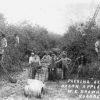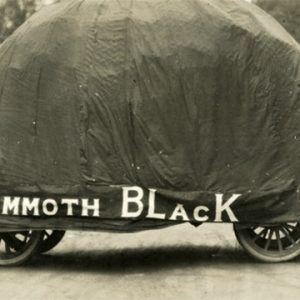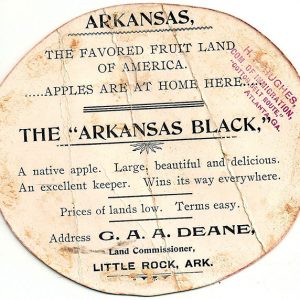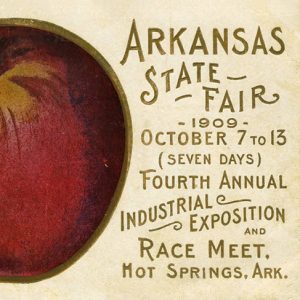calsfoundation@cals.org
Arkansas Black Apple
The Arkansas Black Apple is recognized by early sources as having been first produced in 1870 in the orchard of a Mr. Brathwaite, which was then about one and a half miles northwest of Bentonville (Benton County). The fruit, a variety of Winesap, is usually round and of medium size. The flesh is yellow, fine grained, crisp, juicy, and aromatic, while the skin is dark red to black, hence its name. It ripens in October or November, and the fruit keeps well though the storage season of two to four months. Originally, the tree was thought to be a seedling of the Winesap Apple. It is a true native apple grown in the Ozarks of both Arkansas and Missouri.
There were few large orchards of Arkansas Blacks, but in the late 1800s, the Arkansas Black may have made up ten to fifteen percent of the state’s apple production. By 1920, the codling moth infestation increased and required spraying, which made growing the apples more expensive. The Food and Drug Administration required washing of apples to remove spray residue, and this increased the growing expenses, too. Drought conditions in several years stressed the orchard trees, and the Depression of the 1930s eroded the viability of commercial orchards. Arkansas’s apple industry never recovered, and the Arkansas Black suffered along with the rest of the industry.
The Arkansas Black Apple is susceptible to two major diseases: apple scab and fire blight. Apple scab can be controlled by chemical sprays; fire blight can best be controlled by pruning infected areas.
The Arkansas Black Apple is commonly used as fresh fruit to eat and in pies, cobblers, and table dishes. Before widespread refrigeration, the apples could be dried for future use; crushed for juice, cider, or vinegar; or canned as apple butter for servings through the months after harvest. Arkansas Blacks are still grown today in small orchard areas. It is estimated that they make up three to five percent of the state’s total apple crop.
For additional information:
Calhoun, Creighton Lee, Jr. Old Southern Apples. Blacksburg, VA: The McDonald & Woodward Publishing Company, 1995.
John G. Ragsdale
Little Rock, Arkansas










These apples are hard to come by. The last ones I had were over 10 years ago, purchased at a road-stand in North Carolina. I remember eating them and thinking that they were the best apples that I’d ever eaten–and I grew up in a New England apple orchard.